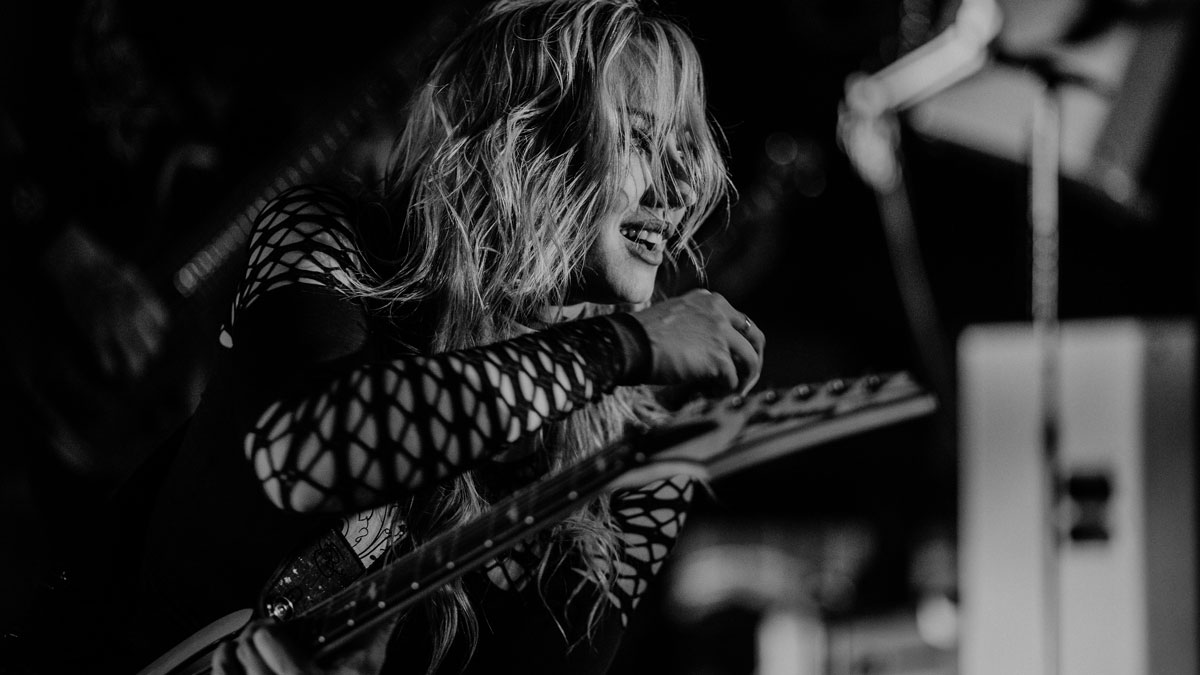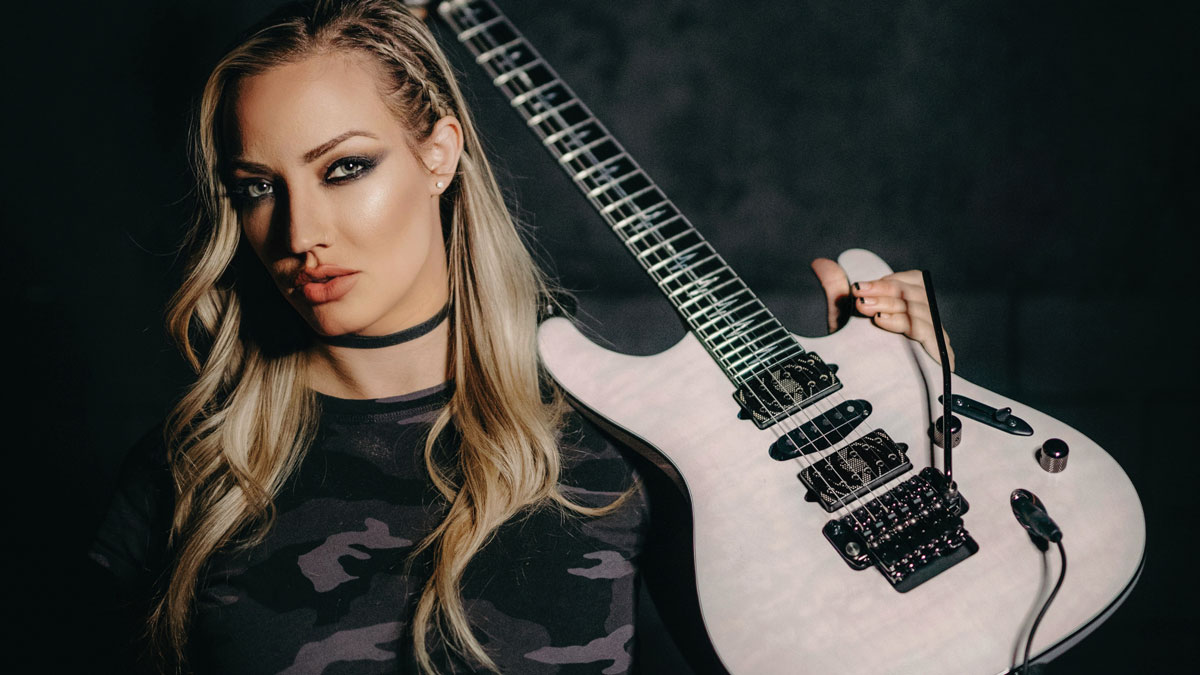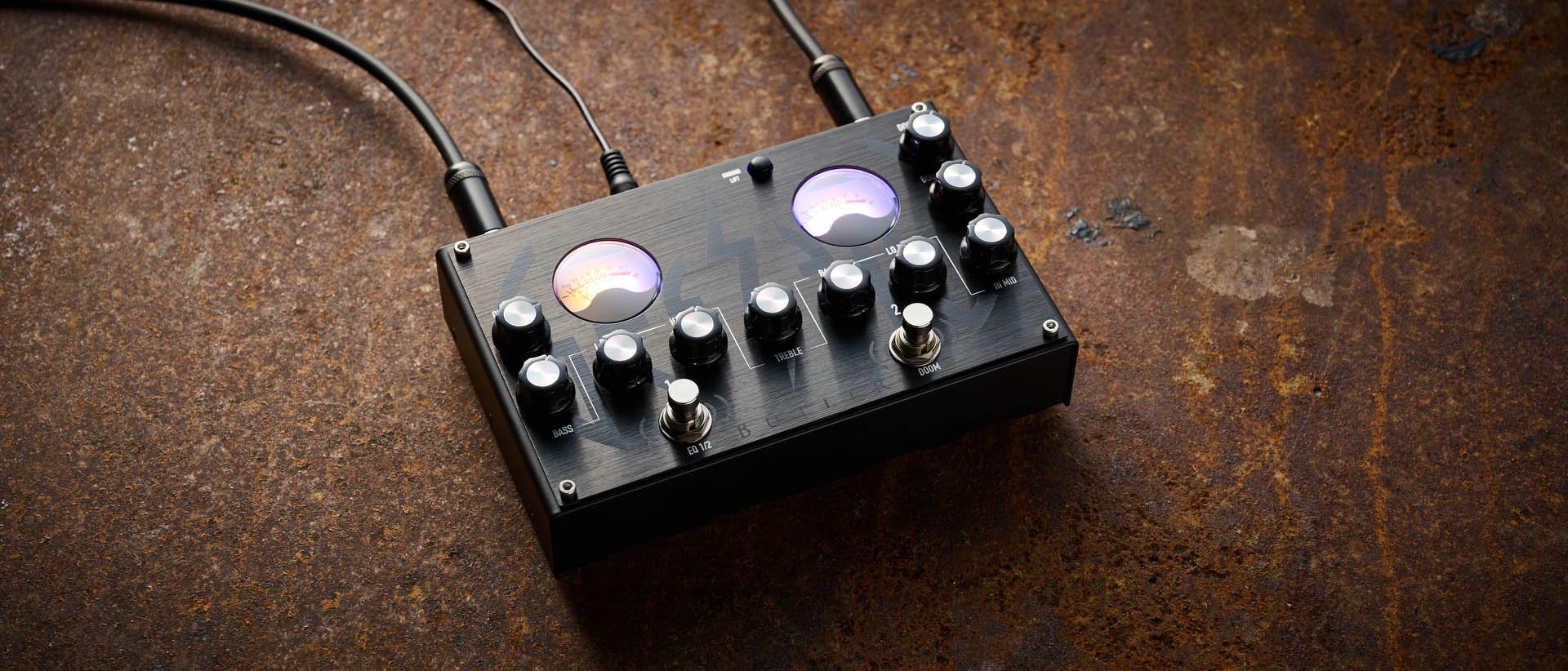“As a kid, I had a hard time making friends. The guitar was a universal way to communicate where I didn’t have to worry about being cool”: For Nita Strauss, the guitar has been a lifelong ally in battling anxiety and addictions
Playing guitar – and playing it live – can be hugely therapeutic. That’s certainly the case for Nita Strauss, who shares how her love for the instrument has helped her fight her demons

This article is part of GuitarWorld.com's series of interviews and features with artists addressing and raising awareness around themes of mental health, particularly as they relate to musicians.
It’s been said that “The journey of a thousand miles begins with one step” (Lao Tzu). For Nita Strauss, that step took place in September 2015. Strauss is approaching eight years of sobriety from alcohol – a journey that is, in many ways, reflected on her new album, The Call of the Void. “It’s not a recovery album,” she says, “but there’s a lot of recovery messaging in it because it’s what I think about a lot.”
Last year, Strauss spent six months on the road with Demi Lovato, a move that created media headlines and, of course, heated debates in accompanying comment sections. What many do not realize, however, is the significance of that musical and personal partnership in Strauss’s recovery.
“It was an incredible experience because it was my first time on a tour that prioritized sobriety,” she says. “All the other tours I’ve been on have been respectful of people who don’t partake, but it’s still around all the time. It was such a healthy experience being on a tour that didn’t have alcohol backstage. It wasn’t a dry tour; people could go out and partake at their leisure if they wanted to, but not in the dressing rooms or areas where Demi and the band were going to be. There were a lot of sober people on that tour and a lot of people in recovery to talk to.
“Demi has been a huge ally on my journey. When I was recovering from knee surgery [in December 2022/January 2023], I had to take pain pills for a few days. Demi was the first person to reach out and ask how I was feeling, and whether I was triggered in any way or needed anything. That struck me as incredible, because she’s one of the biggest stars in the world, and she took the time to reach out to one of her band members, check in, and make sure my recovery was doing okay.”
In an interview with Soundsphere Magazine, you shared that you struggle with anxiety.
“Yes, absolutely. I am a chronic over-thinker, and it’s been very difficult to manage my own expectations of what needs to be done, especially on the road. A lot of people are depending on me for this tour to go well – my band, the crew – and I have a new album. There’s a lot of pressure on me, and for somebody who already struggles with anxiety, that added pressure is not helpful.”
All the latest guitar news, interviews, lessons, reviews, deals and more, direct to your inbox!
How does playing guitar help you cope?
“Guitar is therapeutic. I have always been not the most social person. As a kid, I had a hard time making friends. I found that when I picked up the guitar, it was a universal way to communicate where I didn’t have to worry about being cool. I didn’t have to worry about what people were going to think. All that came later, when I started getting more well known!
“But when I first started playing, it was a healthy way to communicate and make friends. I could go out and kill it onstage and I didn’t have to worry about anything else at that moment. I could just let loose and enjoy playing.
When I’m playing, I’m not worrying about interviews, album numbers, if an email got sent out, if a T-shirt order was placed, or any of the day-to-day things that come with being a musician that are constantly circling around in my mind
“When I’m playing, I’m not worrying about interviews, album numbers, if an email got sent out, if a T-shirt order was placed, or any of the day-to-day things that come with being a musician that are constantly circling around in my mind. All I’m focusing on is the show and my playing and if the audience is having a good time. That, to me, is the best therapy in the world.”
You were on tour during your first year of sobriety. How important was music in getting you through those initial months?
“It was incredibly important. If I was going to make this huge lifestyle change, this sacrifice – I thought of it as a sacrifice at the time – I wanted to become my best and highest-functioning self in the process. I started working out a lot, getting more muscle, losing body fat that came from all the alcohol I was consuming. I was getting better physically, I was getting stronger mentally, and I was playing at my highest level ever at that time. I was improving in leaps and bounds because my mind was clear, my fingers were calm, there were no jitters or shakes, and no hungover, sluggish feeling, so I was firing on all cylinders.”

How soon into recovery did you notice a difference in your playing?
“Immediately. I used to think it was fun to go onstage inebriated. I treated it like a video game, like it wasn’t even real. I would get off stage, and if I made mistakes, I treated it like a joke – 'Oh my God, I was so hammered! Did you see where I slipped and fell?' Or 'I made this mistake, I totally missed this part, ha ha ha.' Looking back, my God, how unprofessional!
“It was kind of fine at the time, especially pre-Alice Cooper, touring with club bands. The audience was three sheets to the wind as well, and we all had a good time together. It was never to the point where it got me in trouble, but now, looking back, the level of disrespect for my audience, the people who paid good money to come and see me – I wish I had given them the show I give them now.”
What was your lowest point?
I was touring at a very high level, playing at a high level, going overseas with bands for the first time, and keeping this terrible secret
“When I was using drugs. I’ve been sober from drugs a lot longer than I’ve been sober from alcohol. When I was at my highest level of using, it was all day, every day, for a couple of years. That was a dark, dark time in my life. When I look back at old pictures, I see a haunted shell of who I am now, and I am very grateful to have gotten out of that relatively unscathed.
“It took me a long time to get over it because I was super-high-functioning. I was touring at a very high level, playing at a high level, going overseas with bands for the first time, and keeping this terrible secret. My band didn’t know, my boyfriend at the time didn’t know, only my friends that I used with knew. Being out of that for many years now gives me the mental clarity to realize how much it affected me at that time.”
How has recovery impacted your role as an inspiration for fans, particularly young women who play or want to play guitar, and of course fans who are also in recovery?
“I wish that people understood what a motivator it is for me to hear their stories. Every time someone comes up to me and says my story has been a part of their recovery, it gives me more strength and solidarity in my own recovery.
It’s still not easy for me. I’m on a tour right now where I’m the only sober person and there are times… we had a hard show one night and afterward I said, 'Honestly, I really want to have a beer right now'
“It’s still not easy for me. I’m on a tour right now where I’m the only sober person and there are times… we had a hard show one night and afterward I said, 'Honestly, I really want to have a beer right now.' It would have been nice to be able to have that to relax and unwind after a hard day.
“So hearing other people’s experiences, hearing them say, 'Because you got sober on tour and you’re maintaining your sobriety on the road, I feel like I can do it too,' gives me that added motivation. I might even be able to let myself down, but I would never let those people down, and because of that, it helps me stay strong in my recovery.”
In your interview with Recovery Today, you discussed the stigmas that women in the music industry still face. There are also stigmas surrounding addiction and recovery. Would you mind addressing that?
“You are very right. Everybody’s recovery is their own, everybody’s journey is their own, no two journeys are exactly the same. Even if you are not an addict, you know somebody who is, or it has affected your life in some way.
“It’s important, if you are on this path, to give yourself grace to walk at your own pace. If there is someone in your life who is on this journey, you also have to allow them to walk this path at their own pace, because things that trigger some people might not trigger others, and things that don’t seem like a big deal to one person might be a big deal to someone else.
“So, as you navigate whatever path you’re on, make sure to give grace, kindness, and empathy to the people around you and also to yourself, because we’re all figuring it out together.”
- The Call Of The Void is out now via Sumerian.
Resources
Alison Richter is a seasoned journalist who interviews musicians, producers, engineers, and other industry professionals, and covers mental health issues for GuitarWorld.com. Writing credits include a wide range of publications, including GuitarWorld.com, MusicRadar.com, Bass Player, TNAG Connoisseur, Reverb, Music Industry News, Acoustic, Drummer, Guitar.com, Gearphoria, She Shreds, Guitar Girl, and Collectible Guitar.
